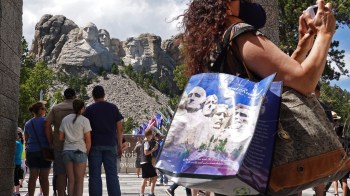Foreign workers flood unexpected places
Kai Ryssdal: You ever been some place on vacation — summer vacation in particular — and strike up a conversation with a local, only to find they’re not really a local at all?
In a lot of places, guest workers from other countries staff the hotels, the local drug stores, even the shoe stores. Wall, S.D., outsources a lot of its summer jobs. So we asked South Dakota Public Broadcasting’s Charles Michael Ray to take a road trip.
Charles Michael Ray: Wall, S.D., is a dusty little western town. It sits near the border of the Badlands National Park. With a population of about 800 people, Wall is the last place you might think of as cosmopolitan. But you’d be wrong. In Wall, you can buy a pair of boots from a Czech.
Jacob Lysek: Fancy cowboy stylish boots for tourists or riding a horse.
You can pick up a souvenir T-shirt from a Kurd.
Aidilia Kanimetova: It’s not hard work, so I can handle it.
And if you want fries with that, a Hungarian is happy to oblige.
Eniko Toth: Most of the time I’m at the window, so I call the numbers.
Jacob Lysek, Aidilia Kanimetova and Eniko Toth are in the United States for the summer on foreign guest worker visas. They’re employed at Wall Drug. You can find everything here from a $1,000 pair of cowboy boots to a five-cent cup of coffee. Mike Huether is the general manger. He says the town is so small they need to bring in more workers to serve some of the three million visitors who will come to South Dakota this year. Huether has brought in workers from 19 different countries.
Mike Huether: Ninety percent of them have two jobs here in Wall. There’s motels, there’s the local restaurants also. And this one chance at making some money for their college and getting better English — they gotta get it while they can.
Those like Eniko Toth from Hungary say foreign workers here get a change to hone their English skills, not just with American customers, but also with fellow workers from around the world.
Toth: I always have to make my roommate repeat what she says especially because she’s from England, so her accent is a bit strange.
Toth others here seem happy at Wall Drug. But it’s not so good elsewhere. This summer, the U.S. Department of Labor fined five South Dakota businesses for short-changing workers on overtime and failing to pay minimum wage. The businesses were also forced to pay $124,000 in back pay. The Labor Department says foreign guest workers are vulnerable. And there is clear evidence of this in South Dakota.
In the town of Rapid City, a number of hotels and businesses also employ foreign guest workers mostly as housekeepers and food service personnel, and their accommodations aren’t always so nice.
Anastasia Loza: You can see that it’s a pretty disgusting place to live.
Anastasia Loza is a student from the Ukraine. She’s one of 17 people who pay $150 per month each to live in this four-bedroom house. That’s 17 people in four bedrooms. Bunk Beds are stacked on top of one another, and there’s two big open sacks of garbage piled up in a kitchen corner. Loza says she and the others here work six days a week.
Loza: I mean no one cleans — just too many people, two bathrooms, and it’s always you know lack of some resources.
James Henderson: Absolutely not do we exploit these kids.
James Henderson is the CEO of the Adoba Eco Hotel. Its parent company Shiba Investments is among those recently fined.
Henderson: These students are educated. They’re smart, they’re wonderful people, and we treat them with respect. And treat them under American law.
Henderson says federal officials inquired about the living conditions and found no problems. It’s not clear though if the hotel is violating city law by packing so many workers in to one house. Local occupancy codes allow only five people who aren’t related by birth or marriage to rent the same house. But local officials also say they can’t investigate the Adoba Eco Hotel’s worker housing without a written complaint.
Back in the kitchen of her temporary home, Anastasia Loza says she has complained about the living conditions and work situation with her sponsors. But Loza says she dropped the complaints because she’s due back home in the Ukraine soon — she won’t be coming back next year.
For Marketplace, I’m Charles Michael Ray.
There’s a lot happening in the world. Through it all, Marketplace is here for you.
You rely on Marketplace to break down the world’s events and tell you how it affects you in a fact-based, approachable way. We rely on your financial support to keep making that possible.
Your donation today powers the independent journalism that you rely on. For just $5/month, you can help sustain Marketplace so we can keep reporting on the things that matter to you.


















